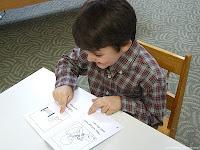Children must master the language of things before they master the language of words.
—Friedrich Froebel, Pedagogics of the Kindergarten, 1895.
Holding to the basic tenets of the Montessori philosophy, theory and method can be a challenge in a world that is growing exponentially in the arena of technological innovation. There is constant pressure to educate young children in ways that are removed from their natural tendencies, and that are contrary to the Montessori way. One example of this is in the area of early reading programs.
Reading is a complex process. It involves auditory and visual discrimination in addition to cognitive construction. Montessori educators understand that children must reach certain developmental milestones in order for learning to become their own. The Montessori teacher prepares the environment to support this development, and her role as observer and guide is key in nurturing this independence. Continue reading as we provide some helpful information in this regard.
Maria Montessori understood that knowledge is acquired by a process of construction. In the Montessori environment lessons are presented at the level a child is living, rather than making the child learn at the level information is given. Montessori theory supports the view that children build cognitive structures first through their senses. In the Montessori environment, this construction begins with the development of gross and fine motor skills, and becomes more elaborate as Montessori students interact with their world. Through observation, participation and experience, Montessori students further build self-confidence as they use their own intelligence to reason and figure things out.
Cognitive Developmental Preparation
Development NeededHolding to the basic tenets of the Montessori philosophy, theory and method can be a challenge in a world that is growing exponentially in the arena of technological innovation. There is constant pressure to educate young children in ways that are removed from their natural tendencies, and that are contrary to the Montessori way. One example of this is in the area of early reading programs.
Reading is a complex process. It involves auditory and visual discrimination in addition to cognitive construction. Montessori educators understand that children must reach certain developmental milestones in order for learning to become their own. The Montessori teacher prepares the environment to support this development, and her role as observer and guide is key in nurturing this independence. Continue reading as we provide some helpful information in this regard.
Montessori Education Builds Development Needed Before Reading
Learning to read is not a race, though some popular media and some contemporary early childhood programs would lead us to believe otherwise. Parents who are driven to give their child an edge in a world of information are pushed to expose their child to the rudiments of reading before the child is developmentally ready. Children who are not developmentally ready to read will only be frustrated when pushed too fast, too soon. Learning to read becomes a distasteful process. Montessori , on the other hand, focuses primarily on developing a lifelong love of learning through a very specific, developmentally-appropriate curriculum.Maria Montessori understood that knowledge is acquired by a process of construction. In the Montessori environment lessons are presented at the level a child is living, rather than making the child learn at the level information is given. Montessori theory supports the view that children build cognitive structures first through their senses. In the Montessori environment, this construction begins with the development of gross and fine motor skills, and becomes more elaborate as Montessori students interact with their world. Through observation, participation and experience, Montessori students further build self-confidence as they use their own intelligence to reason and figure things out.
Cognitive Developmental Preparation
- Sensorial development aids reception of information
- Perceptual development aids in organizing and integrating information
- Neurological development aids in physical procession of information
- Social development aids in understanding relationships between people and events
- Symbolic development aids in decoding
- Concept formation
- Verbal and visual language
- Gross & fine motor control
- Eye-hand coordination
- Ability to perceive figures in space
- Directionality
- Ability to organize spatial relationships
- Ability to differentiate contrasting symbols and sounds
- Ability to classify
- Ability to understand meaning in content
- Strong auditory discrimination
- Ability to focus
- Ability to understand and follow verbal directions
As much as possible, NAMC’s web blog reflects the Montessori curriculum as provided in its teacher training programs. We realize and respect that Montessori schools are unique and may vary their schedules and offerings in accordance with the needs of their individual communities. We hope that our readers will find our articles useful and inspiring as a contribution to the global Montessori community.
© North American Montessori Center - originally posted in its entirety at Montessori Teacher Training on Wednesday, April 28, 2010.
© North American Montessori Center - originally posted in its entirety at Montessori Teacher Training on Wednesday, April 28, 2010.



Good synopsis of indirect preparations for reading. Thank you!
ReplyDeleteThank you, Susanne.
ReplyDelete